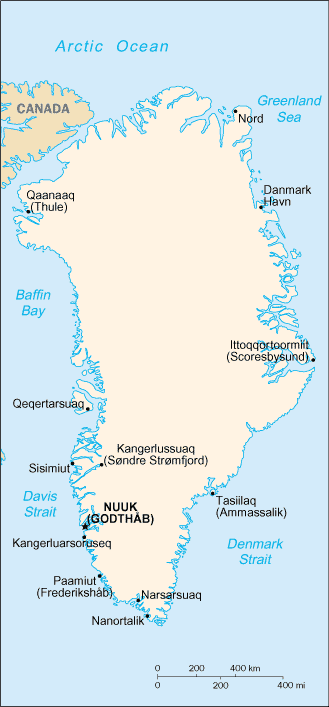|
Greenland
|

|
Capital: Nuuk (Godthab)
Population: 56,672
Brief History of Greenland:
Greenland, which is located between the Arctic and the Atlantic Oceans, is the world's largest island. Over 80% of the Greenland is ice capped, meaning that it is covered with ice all year round.
Greenland was first settled by a series of nomadic tribal peoples. First were the Saqqaq peoples and later came the Dorset peoples. The Dorset were mostly whale hunters. In the 10th Century AD the Vikings came to the territory. They shared the island with the Dorset and later the Thule peoples. The Danish colonized Greenland in the 18th Century and it became a part of the country of Denmark in 1953.
Today Greenland is still a part of the Danish Crown, but is self-governed. Denmark controls the area's foreign relations and defense.
The Geography of Greenland
Total Size: 2,166,086 square km
Size Comparison: slightly more than three times the size of Texas
Geographical Coordinates: 72 00 N, 40 00 W
World Region or Continent: Arctic Region
General Terrain: flat to gradually sloping icecap covers all but a narrow, mountainous, barren, rocky coast
Geographical Low Point: Atlantic Ocean 0 m
Geographical High Point: Gunnbjorn 3,700 m
Climate: arctic to subarctic; cool summers, cold winters
Major cities: NUUK (capital) 15,000 (2009)
The People of Greenland
Type of Government: parliamentary democracy within a constitutional monarchy
Languages Spoken: Greenlandic (East Inuit), Danish, English
Independence: none (part of the Kingdom of Denmark; foreign affairs is the responsibility of Denmark, but Greenland actively participates in international agreements relating to Greenland)
National Holiday: June 21 (longest day)
Nationality: Greenlander(s)
Religions: Evangelical Lutheran
National Symbol: polar bear
National Anthem or Song: Nunarput utoqqarsuanngoravit (Our Country, Who's Become So Old also translated as You Our Ancient Land)
Economy of Greenland
Major Industries: fish processing (mainly shrimp and Greenland halibut); gold, niobium, tantalite, uranium, iron and diamond mining; handicrafts, hides and skins, small shipyards
Agricultural Products: forage crops, garden and greenhouse vegetables; sheep, reindeer; fish
Natural Resources: coal, iron ore, lead, zinc, molybdenum, gold, platinum, uranium, fish, seals, whales, hydropower, possible oil and gas
Major Exports: fish and fish products 94% (prawns 63%)
Major Imports: machinery and transport equipment, manufactured goods, food, petroleum products
Currency: Danish krone (DKK)
National GDP: $2,133,000,000
** Source for population (2012 est.) and GDP (2011 est.) is CIA World Factbook.
Back to Geography Home Page
